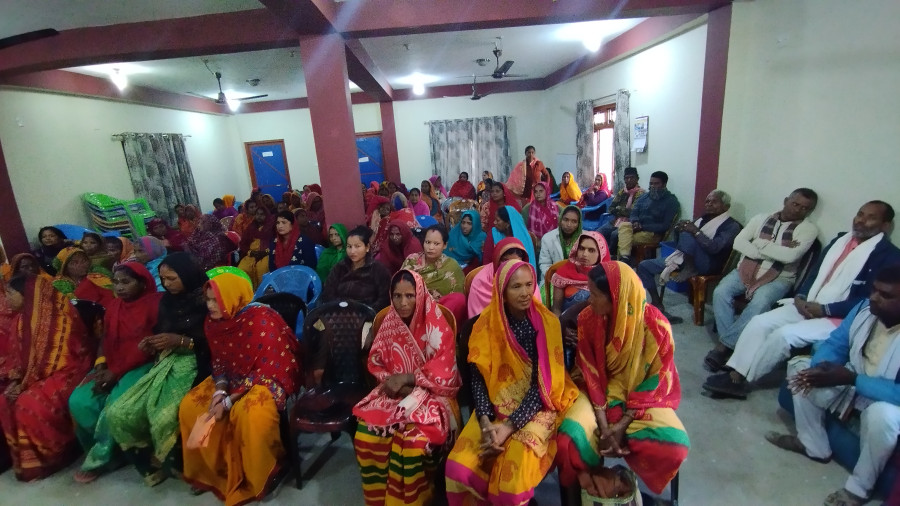Madhesh Province
Exploitative lending practices continue to plague the poor
Around 135 loan shark victims gathered in Bardibas to protest against microfinance firms and loan sharks.
Sunita Baral
Hira Devi Mandal took a loan of Rs1.5 million from Rajshree Finance in Janpur for her two daughters’ weddings three years ago. She pledged her 2.16 kattha of land as collateral with the finance company.
Her debt has now added to Rs1.7 million.
The finance company informed Mandal that the land she had pledged as collateral was now up for auction since she failed to repay the loan instalments as promised.
“We paid a couple of instalments, but soon we couldn’t afford to pay anymore. The loan I had taken for my daughters’ weddings was spent on accumulating their dowries and on other wedding arrangements,” said Mandal. “Since we were having trouble paying the loan back, my two sons decided to go abroad to earn money to pay off the debt. But we had to take another loan of Rs600,000 from a loan shark to facilitate their departure.”
Four and a half years ago, Dinesh Prasad Yadav from ward 5 of Samsi Rural Municipality also took a loan of Rs2.5 million from different loan sharks to get two of his daughters’ married. He now owes Rs3.3 million after failing to pay his instalments on time.
Yadav sold 4.5 kattha of his land to pay off his debt, but the loan sharks insist that he still has to pay another Rs3.3 million.
“The creditors told me that it would be easy to pay them back. They said I could sell my land when the time comes, and my loan would be paid,” said Yadav. “But now they tell me that I still owe them money.”
Yadav has joined others like him who have fallen into the debt trap of loan sharks and are reeling under burgeoning debt. “I have been protesting alongside other victims of loan sharks, finance and microfinance companies,” he said. “I realised that there are many uneducated people like me who were misled by the creditors.”
Shilam Yadav, president of the Committee to Protest Against Microfinance Institutions, Mahottari, said that the moneylenders, loan sharks and financial institutions, target and lure the poor and the needy into taking loans from them and then trap them in the vicious loan cycle.
“Even registered institutions entice the poor and uneducated people to take huge loans knowing that they would not be able to pay the loans back on time so that these institutions can exploit their assets,” said Shilam.
On Tuesday, around 135 loan shark victims gathered in Bardibas to protest against finance corporations and loan sharks.
Yuvaraj Rasaili, the central president of the Committee to Protest Against Microfinance Institutions, Nepal, said financial institutions and loan sharks target the most vulnerable and take advantage of their limited knowledge of the financial system.
“The financial institutions engage in usurious lending. Loan sharks have been found to have prepared documents showing that the borrowers had taken more loans than they had actually borrowed,” said Rasaili. “Such malpractices must be put to an end.”
The government in April formed an inquiry commission to address loan sharking problems and to facilitate negotiations. It submitted its report to the government earlier in December. After collecting the complaints, the commission had formed a task force in each district headed by an assistant chief district officer in an attempt to settle disputes through compromise decrees.
On July 28 this year, the practice of loan sharking was criminalised by amending the National Criminal Procedure (Code) Act 2017.
According to the inquiry commission, as of December, it settled as many as 5,188 complaints of a total of 27,582 through compromise. The Madhesh Province districts—Saptari, Bara, Parsa, Dhanusa, Rautahat, Siraha, Mahottari, and Sarlahi—have the highest number of loan sharking cases in the country.
As per the new legal provisions, loan sharking means compelling victims to sign a promissory note without any money being lent, mentioning higher amounts in the documents than what was lent, and preparing a promissory note by adding the interest to the principal amount before lending.
Other punishable offences include not providing receipts for the amounts paid by the borrowers, threatening and exploiting borrowers, and unlawfully seizing their properties.
The new law brought into force in July criminalises the practice of lending money for interest through unfair transactions.
Under this law, offenders are subject to jail terms of up to seven years along with fines as high as Rs70,000 for loan sharks.
As per law, if a loan shark has confiscated cash or property of the borrower, an equivalent sum or property should be returned to the borrower. “If it is proved that the ownership of fixed assets of the borrower has been transferred in the name of a person nominated by the loan shark, such transfer becomes null and void,” the law states.
Mandal whose sons left for foreign employment a few months ago have not sent home any money since they have found themselves in dire financial stress on foreign shores. Although Mandal is now aware of what the law guarantees those like her who have fallen into debt cycles, she is having a hard time trying to take her house back from her creditors. “Both the finance company and the loan sharks have been hounding me for repayment. They even kicked us out of our house,” Mandal told the Post. “I don’t know what to do now. My sons have not been able to send me money. I feel trapped and helpless.”




 27.12°C Kathmandu
27.12°C Kathmandu













